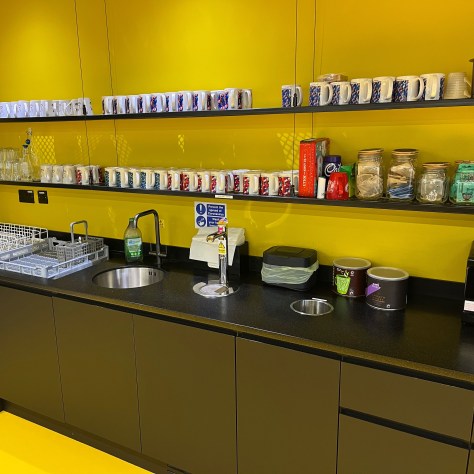
At this time of year, many universities run teaching and learning conferences.
I have spoken at a few of these myself. In July 2020 I presented (online) at the University of Hertfordshire Teaching and Learning Conference. In July 2021 I did a keynote at the University of Cumbria Annual Learning & Teaching Fest. The week before that I had spoken at the LJMU Active Blended Learning Conference.
What I do find though, if I am not speaking, is I usually find out about these kinds of conferences, while they are happening on Twitter.
This year we are seeing a lot more conferences happening in-person. So when I saw that City, University of London, were running their Learning at City teaching conference in-person and were welcoming external delegates, and it hadn’t happened yet, I signed up.
One of my reasons for attending was to find out more about their approach to hybrid teaching, which I had read about online.
After coffee and pastries, we had the welcome and opening keynote.

Friend or Foe? Configuring the Role of Assessment as an Opportunity to Transform the Quality of Higher Education was presented by Professor Susan Deeley, who is Professor of Learning and Teaching(Urban Studies) at the University of Glasgow.
Taking a holistic view of its functions, assessment can be utilised in versatile ways to be effective and efficient. Playing a vital role at the heart of learning and teaching, authentic and sustainable assessment is key to facilitating students’ development of skills, competencies, and graduate attributes. This is in addition to enabling students to demonstrate their academic knowledge, understanding, and critical thinking. Stepping beyond traditional assessment boundaries, a less conventional path is explored where students are actively engaged through assessment and feedback literacies within a staff-student partnership approach to learning and teaching. It is asserted that this leads to students’ deeper learning and a more democratic classroom. Configuring such a positive role for assessment transmutes it into an intrinsically motivating force that can transform the quality of higher education.
The talk covered a range of issues relating to assessment, and I did a sketch note of the talk.

One of the questions at the end of the conference was how challenging it would be to change the assessments within a module due to the validation process that was quite rigid and lacked flexibility for change at pace, or would require re-validation. This is indicative of processes that were designed for in-person courses that would change rarely, lacked flexibility and agility. Sometimes there are good reasons for that, but it does mean that sometimes though you can’t be responsive.
Having booked into parallel sessions, I did the usual thing and go to the “wrong” session.
I had intended to go to the Discover Learning Design with LEaD session, but in the end, went to a session with two papers.
Understanding student digital experiences at City, University of London and From face-to-face to remote learning: what can we learn from student experiences of pre-recorded lectures in the pandemic?
The first presentation was about the results of the Jisc Student Experience Insights survey at City.
Whilst teaching has moved back to campus, for many students there are still online or blended elements to their learning. It is therefore important to continue to evaluate student experiences of technology for learning. This paper will present the results from the 2021/22 iteration of the survey carried out at City during Spring 2022. The session will compare the results with the national benchmark from Jisc and previous iterations of the survey to see how the Covid-19 pandemic has impacted on student digital learning experiences.

It was interesting to see how a university was actually using the survey to inform decision making.
The second paper was focused on a cohort of students.
We explore students’ experience of asynchronous learning activities, with a specific focus on pre-recorded lectures and consider their role in promoting deep learning in an online education context.
In this subject lecturers pre-recorded their lectures to help provide a more engaging learning experience. It was also designed to be more inclusive for those attending online.

In the presentation, we heard that student feedback was in the main positive, it was seen as more flexible, more accessible, students were able to interact with the recordings when they wanted to, and could rewind, review and drop into the recordings. It was also interesting to hear about the importance of captions (or transcripts) of the recordings.

After lunch there were two more sessions, I attended The Pedagogy of Hybrid Space and Transforming your presentation slides for online learning.
These were interesting sessions and demonstrated by their delivery the challenges of delivering hybrid (as in dual mode simultaneous) sessions. I will focus on these two sessions in a later blog post.
The final session of the day was a summary of the day and a celebration of staff achievements.
Overall I had a really good day and enjoyed all the sessions I attended.









































